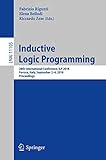Inductive Logic Programming [electronic resource] : 28th International Conference, ILP 2018, Ferrara, Italy, September 2-4, 2018, Proceedings / edited by Fabrizio Riguzzi, Elena Bellodi, Riccardo Zese.
Contributor(s): Riguzzi, Fabrizio [editor.] | Bellodi, Elena [editor.]
| Bellodi, Elena [editor.] | Zese, Riccardo [editor.]
| Zese, Riccardo [editor.] | SpringerLink (Online service)
| SpringerLink (Online service) .
.
Material type:  BookSeries: Lecture Notes in Artificial Intelligence: 11105Publisher: Cham : Springer International Publishing : Imprint: Springer, 2018Edition: 1st ed. 2018.Description: IX, 173 p. 201 illus., 20 illus. in color. online resource.Content type: text Media type: computer Carrier type: online resourceISBN: 9783319999609.Subject(s): Artificial intelligence
BookSeries: Lecture Notes in Artificial Intelligence: 11105Publisher: Cham : Springer International Publishing : Imprint: Springer, 2018Edition: 1st ed. 2018.Description: IX, 173 p. 201 illus., 20 illus. in color. online resource.Content type: text Media type: computer Carrier type: online resourceISBN: 9783319999609.Subject(s): Artificial intelligenceDerivation reduction of metarules in meta-interpretive learning -- Large-Scale Assessment of Deep Relational Machines -- How much can experimental cost be reduced in active learning of agent strategies? -- Diagnostics of Trains with Semantic Diagnostics Rules -- The game of Bridge: a challenge for ILP -- Sampling-Based SAT/ASP Multi-Model Optimization as a Framework for Probabilistic Inference -- Explaining Black-box Classifiers with ILP - Empowering LIME with Aleph to Approximate Non-linear Decisions with Relational Rules -- Learning Dynamics with Synchronous, Asynchronous and General Semantics -- Was the Year 2000 a Leap Year? Step-wise Narrowing Theories with Metagol -- Targeted End-to-end Knowledge Graph Decomposition.
This book constitutes the refereed conference proceedings of the 28th International Conference on Inductive Logic Programming, ILP 2018, held in Ferrara, Italy, in September 2018. The 10 full papers presented were carefully reviewed and selected from numerous submissions. Inductive Logic Programming (ILP) is a subfield of machine learning, which originally relied on logic programming as a uniform representation language for expressing examples, background knowledge and hypotheses. Due to its strong representation formalism, based on first-order logic, ILP provides an excellent means for multi-relational learning and data mining, and more generally for learning from structured data.


There are no comments for this item.